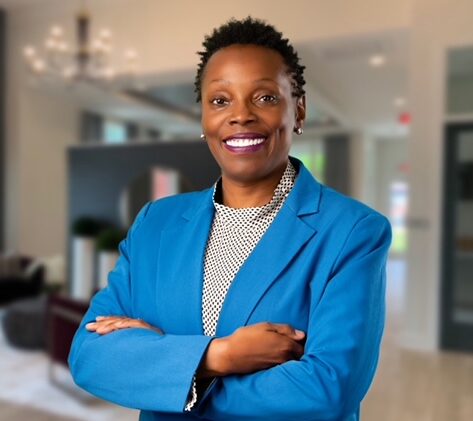By Brennan LaBrie
When Dr. Stacey Brown was Associate Director of Academic Achievement Programs at the University of Maryland, helping low-income and first-generation students successfully transition into college, she noticed a troubling trend: New students would arrive with Advanced Placement classes under their belt, but no college credit on their transcripts.
This meant that students were taking AP classes, but not passing the final exam.
“That was something that really sat heavy on my heart,” she said, adding that credit for these courses gives students better odds at being accepted into rigorous programs and reduces their time – and money – spent in college.

After 15 years at Maryland, much of it as Senior Program Director in the Career Center, Dr. Brown’s family relocated to Charlotte, and she soon found herself helping students from underserved and underrepresented backgrounds enroll in, and pass, AP classes.
At Charlotte-Mecklenburg Schools, Dr. Brown worked in partnership with EOS to help open access to AP classrooms for Black, Hispanic, and low-income students. In five years at CMS, she expanded this work from four to 20 schools and set an expectation that all AP students sit for the exams.
Now, as EOS’ new Director of Learning and Development, Dr. Brown is continuing to help AP students thrive. She will lead professional development and training for AP U.S. History and AP Government and Politics teachers in Charlotte-Mecklenburg Schools and Prince William County Public Schools.
This work is funded by the Action for Equity in History and Civics grant, awarded to EOS by the U.S. Department of Education last year.
Educators who sign up for the program will be trained to cultivate cues and conditions of belonging in their classrooms in order to create spaces in which students from all backgrounds can succeed. Teachers can “instill mindsets of excellence and high expectations” in students while also making them feel welcome and supported in that class, she said.
The training centers on “making sure that we incorporate culturally-relevant curriculum, making sure that we create a community where students don’t mind asking questions, where students feel like they are reflected in what they’re learning and that they can express themselves freely – all of the things that really help with a variety of identities and respect for those identities,” she said.
The classroom environment she seeks to help cultivate is one in which all students engage in candid conversation and debate with their teacher and each other, and respectful disagreement is encouraged.
Having historically worked in student success in advanced courses and college at large, Dr. Brown is eager to home in on improving advanced history and civics education due to the importance of the subject matter.
“It really does help us, as citizens of the United States, look at some of our founding documents and really think critically on when they were created, how they were created, for whom they were created, how it impacts who we are today, and how we interact and create policies and laws and all of those good things that impact our daily living,” she said. “It allows students and allows teachers to really self-reflect, to think about their personal and lived experiences and how we can create a more fair, just, and equitable environment to live in on a daily basis.”
Across all the roles she has held in secondary and higher education, Dr. Brown’s mission has remained the same – helping students prepare for, transition into, and graduate college by giving them as many opportunities to succeed as possible. Training teachers to be trusted adults and mentors for students plays a crucial role in this work – as she can attest from personal experience.
“As a high school student I had friends in AP courses – however, there was an assumption and possibly a reality that students had to be recommended for AP courses,” she said. “I excelled in my college prep track courses – however, not one of my teachers or trusted adults recommended me or engaged in a conversation with me about taking AP courses.”
Trusted adults, ideally, will not only encourage students to enroll in advanced courses, but to advocate for themselves – something she didn’t know she could do when it came time to enroll in AP classes herself.
“In my position with EOS, I want to be instrumental in sharing with teachers how to create brave spaces for students of color to believe that they belong while building their confidence, networks, and advocacy skills to excel in AP courses and beyond,” she said.
Brennan LaBrie helps EOS and its partners tell their stories and spread awareness of their work through the mediums of print, audio and video. With a background in local journalism, he loves sharing the stories of the individuals and organizations driving impact in their community and beyond.